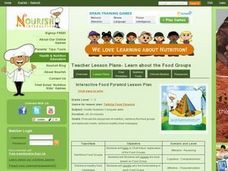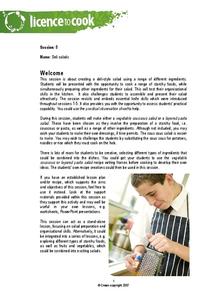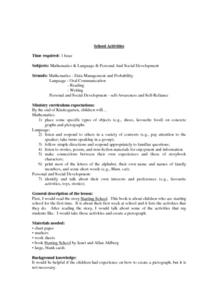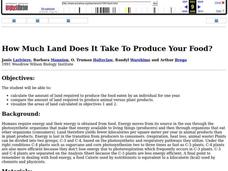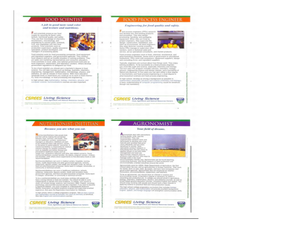Curated OER
Coral Reefs
Students research an inhabitant of a Caribbean coral reef using a list of common organisms that live on or near it. Students then write a description of their organism and draw a picture or a 3-D model of it. Eventually they all work...
Curated OER
Funky Fungus
Learners discuss decomposition, bacteria, fungi and other microscopic organisms. They participate in an experiment to grow fungus on bread. As the fungus colonies grow, students observe them under a microscope to identify and locate...
Curated OER
Interdependence and Adaptation
Fifth graders construct a food web to illustrate how animals and plants are interdependent. In this interdependence lesson, 5th graders identify how consumers, producers, herbivores, carnivores and predators are related in a habitat....
Curated OER
Protecting Our Planet
Students examine the impact of pollution. In this pollution lesson, students watch Protecting Our Planet, then participate in a simulation of the effect of pollution on a variety of organisms.
Curated OER
Exploring the Web of Life
Students develop a classroom definition of and explore ideas related to ecosystems. They create a food web using pictures and yarn.
Curated OER
The Human Organism
Students identify their feelings and learn constructive ways of handling conflict. In this human mental health instructional activity, students identify their feelings, learn how to tell others about their feelings, and learn how to...
Curated OER
Food Webs in the Bay
Students get acquainted with a type of ecosystem and how different organisms of that ecosystem compete with one another for resources. They analyze the submerged aquatic vegetation of a bay ecosystem. Students study plants.
Curated OER
Interactive Food Pyramid
Students participate in the game, "Talking Food Pyramid." In this nutrition lesson, students recognize the organization of foods in to five groups. Students conclude by physically classifying a selection of foods in two groups.
Curated OER
It's Time to Get Organ-Wised
Students engage in a lesson which contains several ideas for a unit on the body and body organs. They solve riddles, color in shapes of organs, participate in games and read about the functions of the various organs. Worksheets are...
Curated OER
Food Preferences and Healthful Eating
Young scholars discuss healthy eating habits. In this food preferences lesson, students read a scenario about teenagers visiting a restaurant. Young scholars role play the story and complete a graphic organizer.
University of California
Energy and Biomass Pyramids
Young scientists play tag as they act out the food pyramid in the ocean ecosystem. Energy circles pass from the smaller prey to the predators and at the end of the activity, a data chart and analysis questions allow pupils to apply their...
Chicago Botanic Garden
Nature Walk and Ecosystem Introduction
A food web has no organism higher than a tertiary consumer because there wouldn't be enough energy left to sustain them. The fourth installment in a seven-part series begins with a nature walk to get pupils thinking about their...
Montana State University
Everest Extremes: Biodiversity
How many animals can live in a climate as cold as Mount Everest's? Find out with a science lesson all about biodiversity. Activities include research, presentations, group work, coloring maps, and a simulation of a food web.
Food a Fact of Life
Deli Salads
The challenge in this foods lesson is staying organized in the kitchen while preparing a vegetable couscous salad or a layered pasta salad. Young cooks work in teams to prepare these nutritious meals.
Curated OER
School Activities
First graders place some specific types of objects (e.g., shoes, favorite food) on concrete graphs and pictographs. They listen and respond to others in a variety of contexts (e.g., pay attention to the speaker; take turns speaking in a...
Curated OER
Green Genes: Genetically Modified Organisms in Our Food
Students investigate how and why genetically modified organisms are used as food crops. They identify the advantages and disadvantages of these crops through internet research then present their views and discuss them as a large group.
Curated OER
Forest Food Webs
Students consider the interdependency of life in a temperate forest by studying selected organisms from an Asian temperate forest and creating a food web.
Curated OER
How Much Land Does It Take To Produce Your Food?
Young scholars calculate the amount of land required to produce the food eaten by an individual for one year. They compare the amount of land required to produce animal versus plant products. Students visualize the areas of land...
Curated OER
The Effects of Pesticides on the Food Chain
Fourth graders generalize that all animals, including people, depend on plants as a food source. In this science lesson plan, 4th graders describe and construct a food chain, tell how pesticides enter the food chain, and discuss possible...
Curated OER
The Human Organism
In this digestion and nutrition lesson, 3rd graders test foods to find their vitamin content. Students test for starch and fats then compare their findings on charts and oral reports. The lesson concludes with a teacher directed...
Curated OER
Foods II Introductory Review Practical Test
Students have a lab experience preparing a recipe demonstrating the techniques learned from Foods I. They identify and explain the appropriate use and care of basic kitchen equipment. They apply the skills and techniques of proper...
Curated OER
The Optimization of Food
Students discuss nutrition and how to make better choices with food. In this algebra and nutrition lesson, students discuss the way the body process food and the importance of nutrition for our cells. They discuss calories, fats and...
Curated OER
Michigan Food: From Farm to You
Learners recognize Michigan on a map and understand how its climate is affected by the Great Lakes. In this Michigan food lesson, students play a trivia game to identify the produce of Michigan. Learners relate the climate in each part...
Curated OER
Ethical Ways to Acquire and Distribute Fish as a Food Source
Students complete a variety of activities as they examine the ethics of acquiring and distributing fish as a food source. They touch on the ethics involved in genetically modified salmon, as well.
Other popular searches
- Con Pair Organic Foods
- Organic Foods Taste
- Non Organic Foods
- Com Pair Organic Foods
- California Organic Foods
- Compair Organic Foods
- Conpair Organic Foods
- Organic Foods Lesson Plan







